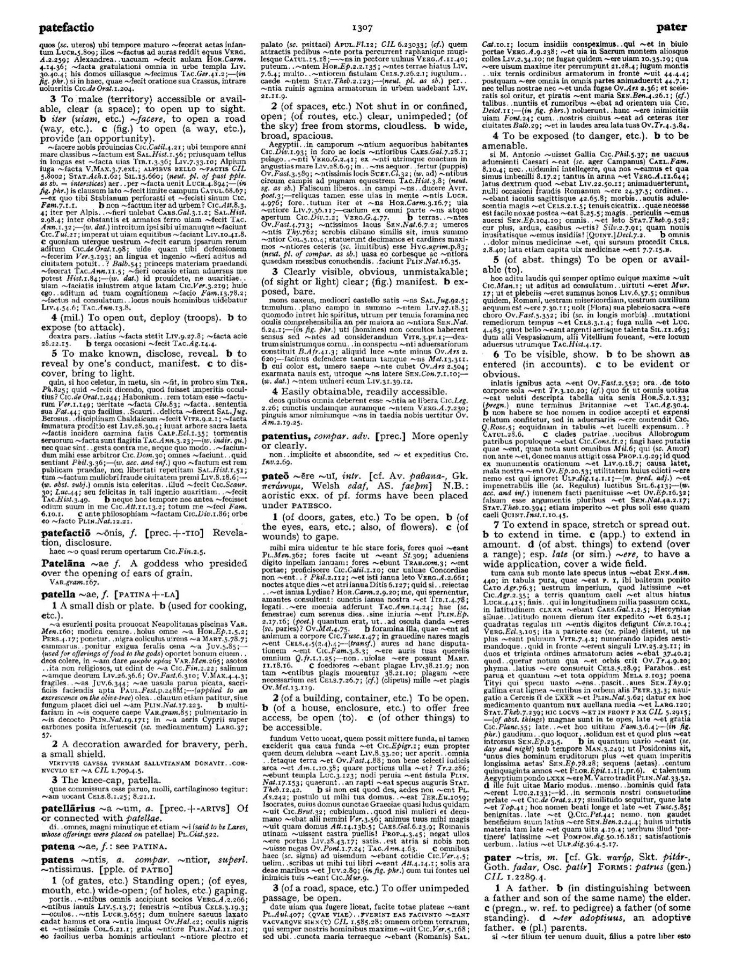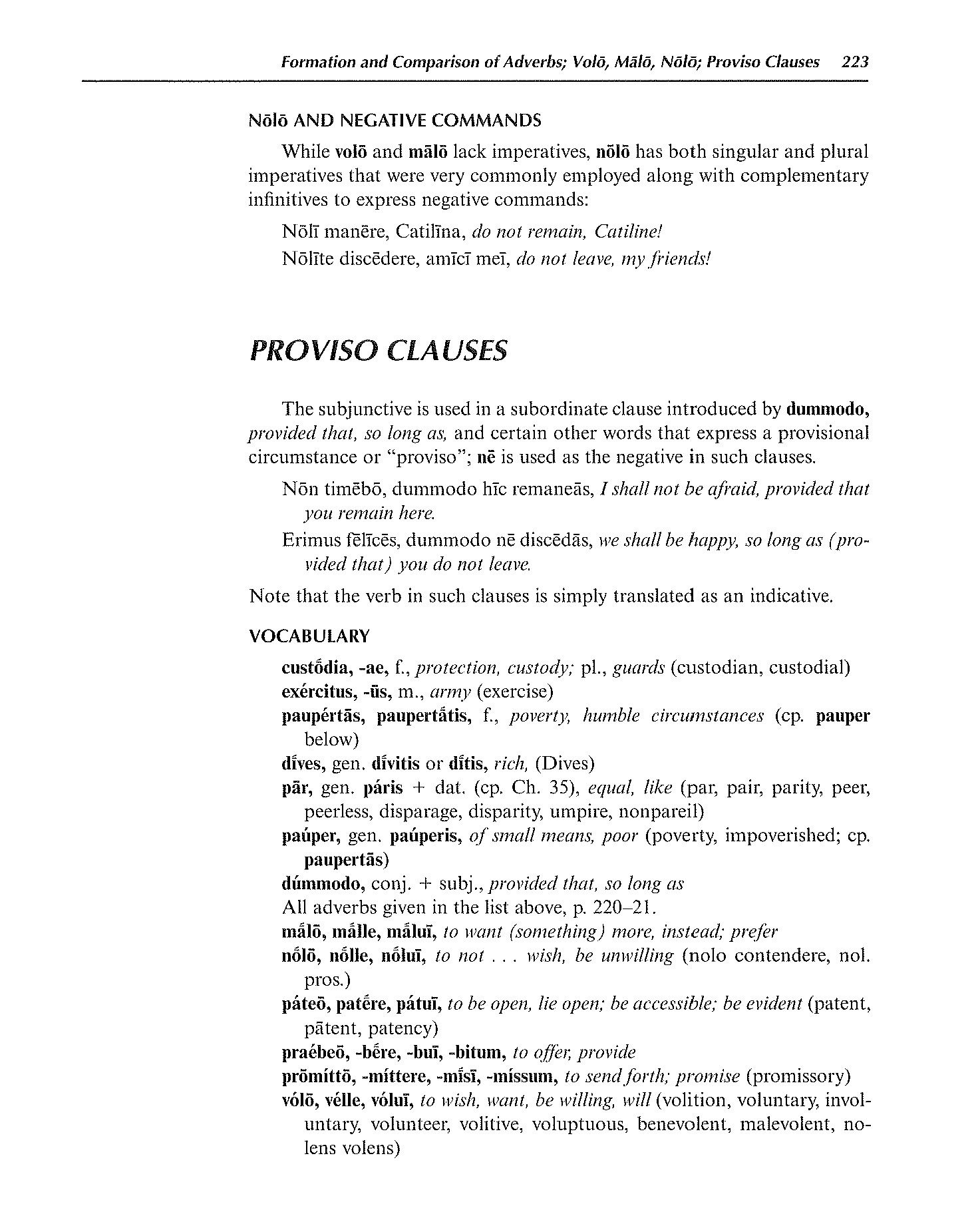
page_listing.tpl
page_subListingDetails.tpl
sub_listingDetails_style1.tpl
sub_listingDetails.title.tpl
patēre To be open
patēre is a Latin Verb that primarily means To be open.
Definitions for patēre
Wheelock's Latin
Verb
- 1
to be open, lie open, be accessible, be evident
English derivatives:
patent pātent patency
Oxford Latin Dictionary
Verb
- 1
(of doors, gates, etc.) To be open. (b) (of the eyes, ears, etc.; also, of flowers). (c) (of wounds) to gape.
- 2
(of a building, container, etc.) To be open. (b) (of a house, enclosure, etc.) to offer free access, be open (to). (c) (of other things) to be accessible.
- 3
(of a road, space, etc.) To offer unimpeded passage, be open.
- 4
To be exposed (to danger, etc.). (b) to be amenable.
- 5
(of abst. things) To be open or available (to).
Sentences with patēre
Latin to English
Ibi terra est aequior et plūs patet.Compare There the land is more level and is more open.
Quaque patet domitis Romana potentia terris, ore legar populi, perque omnia saecula fama, siquid habent veri vatum praesagia, vivam.Compare Wherever Rome's power extend overs the conquered world, I shall have mention on men's lips, and if the prophecies of bards have any truth, through all the ages shall I live in fame.
Facilis descensus Averno: noctes atque dies patet atri ianua ditis; sed revocare gradum superasque evadere ad auras, hoc opus, hic labor est.Compare The way to Avernus is easy; night and day lie open the gates of death's dark kingdom; but to retrace your steps, to find the way back to daylight- that is the task, the hard thing.
Vos dormio, nec adhuc ego videor intelligo, quam ego pateo, et quam sum imbecillus.Compare You are asleep, and do no even appear to me to understand how open we are to attack, and how weak we are.
Conjugation table for patēre
Cactus2000
| ACTIVE | |
| Indicative present | Indicative imperfect |
| pateō patēs patet patēmus patētis patent | patēbam patēbās patēbat patēbāmus patēbātis patēbant |
| Indicative perfect | Indicative pluperfect |
| patuī patuistī patuit patuimus patuistis patuērunt / patuēre | patueram patuerās patuerat patuerāmus patuerātis patuerant |
| Indicative future | Indicative future perfect |
| patēbō patēbis patēbit patēbimus patēbitis patēbunt | patuerō patueris patuerit patuerimus patueritis patuerint |
| Subjunctive present | Subjunctive imperfect |
| pateam pateās pateat pateāmus pateātis pateant | patērem patērēs patēret patērēmus patērētis patērent |
| Subjunctive perfect | Subjunctive pluperfect |
| patuerim patueris patuerit patuerimus patueritis patuerint | patuissem patuissēs patuisset patuissēmus patuissētis patuissent |
Infinitive present patēre Infinitive perfect patuisse Infinitive future - | Imperative present patē patēte Imperative future patētō patētō patētōte patentō |
| PARTICIPLE | ||
| Participle present active | ||
| patēns | patentēs | |
| patēns | patentēs | |
| patēns | patentēs | |
| patēns | patentēs | |
| patēns | patentēs | |
| Participle future active | ||
| - | - | |
| - | - | |
| - | - | |
| - | - | |
| - | - | |
| Participle perfect passive | ||
| - | - | |
| - | - | |
| - | - | |
| - | - | |
| - | - | |
| Gerundive | ||
| patendus | patendī | |
| patendus | patendī | |
| patendus | patendī | |
| patendus | patendī | |
| patendus | patendī | |
| Gerund | Supine | |
| patēre | - | |
| patēre | - | |
| patēre | ||
| patēre | ||
| patēre | ||
| PARTICIPLE | ||
| Participle present active | ||
| Nom. | patēns | patentēs |
| Gen. | patentis | patentium |
| Dat. | patentī | patentibus |
| Acc. | patentem | patentēs |
| Abl. | patente | patentibus |
| Participle future active | ||
| Nom. | - | - |
| Gen. | - | - |
| Dat. | - | - |
| Acc. | - | - |
| Abl. | - | - |
| Participle perfect passive | ||
| Nom. | - | - |
| Gen. | - | - |
| Dat. | - | - |
| Acc. | - | - |
| Abl. | - | - |
| Gerundive | ||
| Nom. | patendus | patendī |
| Gen. | patendī | patendōrum |
| Dat. | patendō | patendīs |
| Acc. | patendum | patendōs |
| Abl. | patendō | patendīs |
| Gerund | Supine | |
| Nom. | patēre | - |
| Gen. | patendī | - |
| Dat. | patendō | |
| Acc. | patendum | |
| Abl. | patendō | |
Data sources
Notes
- Definitions
- Frederick M. Wheelock, Wheelock's Latin, 6th ed., rev. Richard A. LaFleur (New York, NY: HarperCollins Publishers, 2005): 223.
- P. G. W. Glare, Oxford Latin Dictionary, Vols. 1-8 (Oxford: Clarendon Press, 1982): 1307.
- Word frequencies
- Christopher Francese, "Latin Core Vocabulary," Dickinson College Commentaries, last modified 2014, http://dcc.dickinson.edu.
- Paul B. Diederich, The Frequency of Latin Words and Their Endings, PhD diss., (Columbia University, 1939).
Bibliography
Allen, Joseph H. Allen and Greenough's New Latin Grammar for Schools and Colleges: Founded on Comparative Grammar. Edited by James B. Greenough, George L. Kittredge, Albert A. Howard, and Benjamin L. D'Ooge. Boston, MA: Ginn & Company, 1903.
Crystal, David. A Dictionary of Linguistics and Phonetics. 6th ed. Oxford, UK: Blackwell Publishing, 2008.
Delatte, Louis, Suzanne Govaerts, Joseph Denooz, and Etienne Evrard. Dictionnaire fréquentiel et index inverse de la langue latine [Frequency Dictionary and Inverse Index of the Latin Language]. Liège, Belgium: Laboratoire d'analyse statistique des langues anciennes de l'Université de Liège (L.A.S.L.A.), 1981.
Diederich, Paul B. The Frequency of Latin Words and Their Endings. PhD diss., Columbia University, 1939.
Francese, Christopher. "Latin Core Vocabulary." Dickinson College Commentaries. Last modified 2014. http://dcc.dickinson.edu/latin-vocabulary-list.
Gildersleeve, Basil L., and Gonzales Lodge. Gildersleeve's Latin Grammar: Third Edition, Revised, and Enlarged. 3rd ed. London, England: Macmillan and Co., 1903.
Glare, Peter G.W. Oxford Latin Dictionary. Vols. 1-8. Oxford, England: Clarendon Press, 1982.
Krüger, Bernd. "Latin Conjugation Tables." Cactus2000. Accessed May 5, 2023. https://latin.cactus2000.de/index.en.php.
Pierson, Nick. "Sound of Text." Accessed October 26, 2019. https://soundoftext.com.
Wheelock, Frederick M. Wheelock's Latin. 6th ed. Revised by Richard A. LaFleur. New York, NY: HarperCollins Publishers, 2005.
Wiktionary Contributors. "Victionarium." Wikimedia Foundation, Inc. Updated March 18, 2019. https://la.wiktionary.org/wiki/Victionarium:Pagina_prima.
Citation
Chicago (17th ed.)
Allo Contributors. "pateō, patēre, patuī (v.) - Latin Word Definition." Allo Latin Dictionary. Last modified . Accessed February 19, 2026. http://ancientlanguages.org/latin/dictionary/pateo-patere-patui.
Entry created on . Last updated on .







